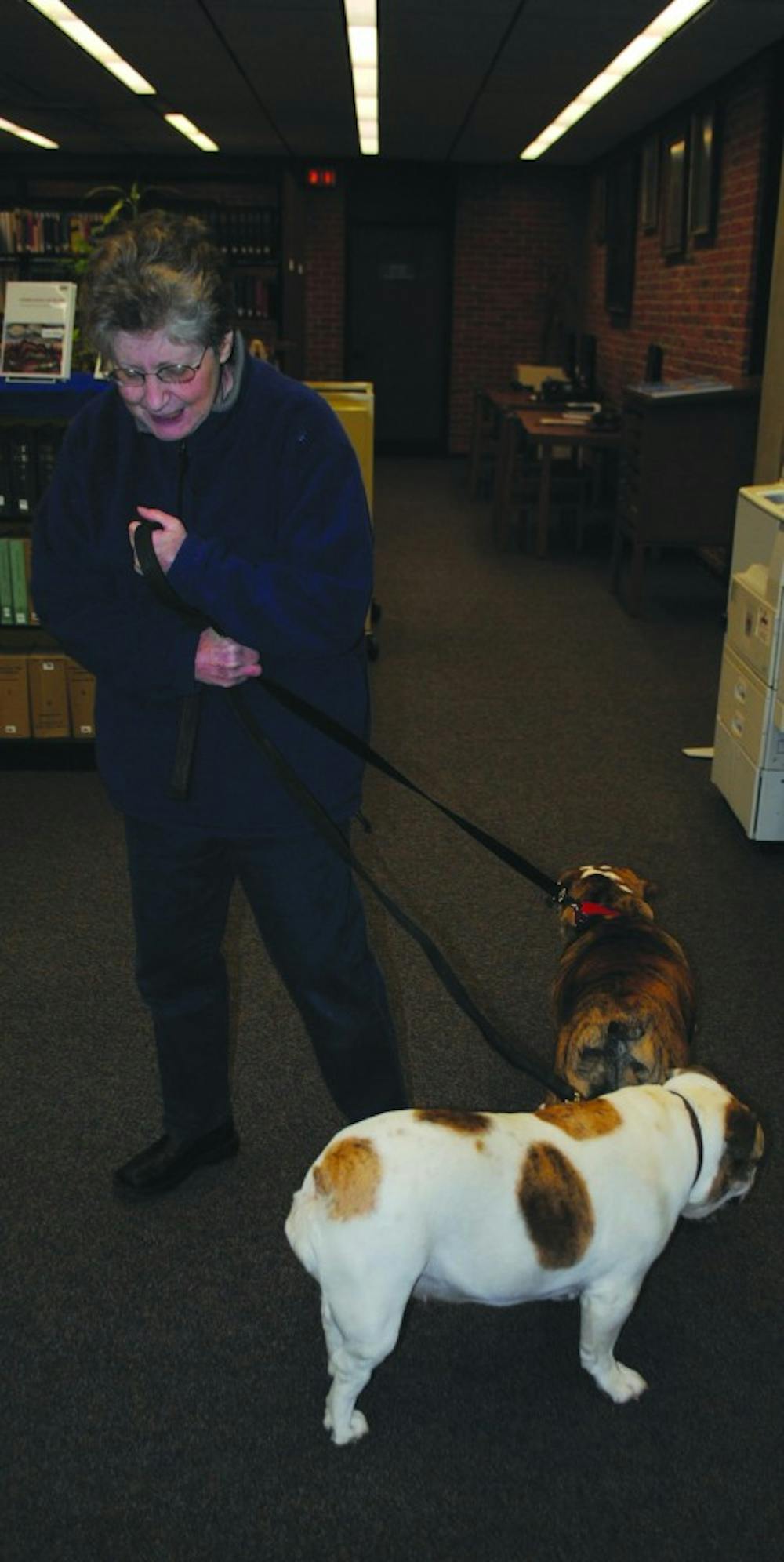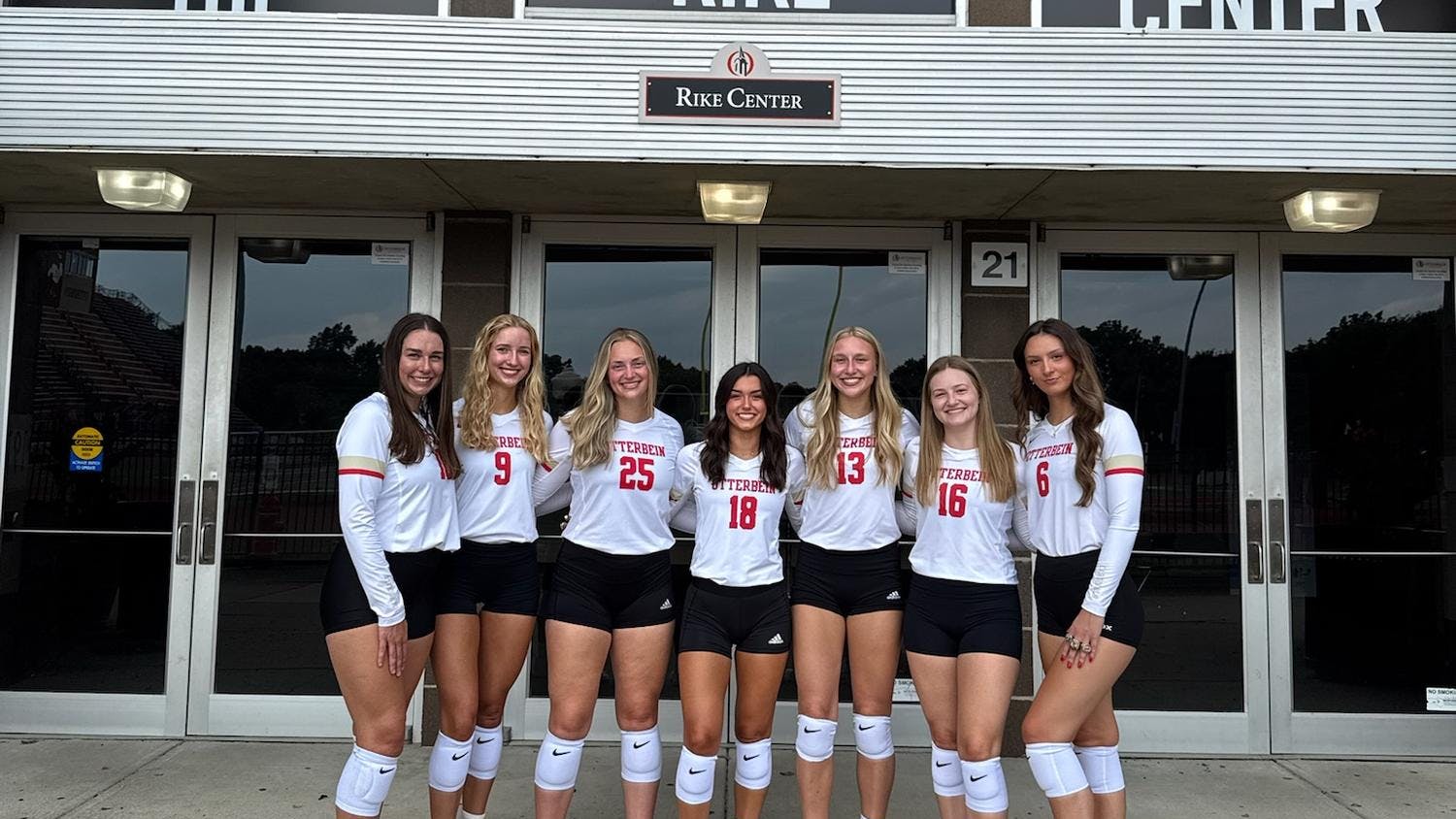You’ve all seen her, in her slacks with her short brown hair, windblown face, and dog leash in hand; Peg Harmon has woven her image into all of our minds. Most students might not be able to place a name to her face, yet she has seamlessly become a part of Otterbein’s campus and the everyday lives of students. She’s been a part of the community since the early ’70s and has become a part of our history. Her image is painted in the minds of Otterbein students from decades ago because of her involvement with the early black students at Otterbein and also her involvement with the local fraternity Pi Kappa Phi. Although her love for learning plays an enormous part of her reasons for wanting to live practically on campus, it is the students who keep her here today.
In the ’70s, Harmon moved to Westerville with her then-husband when a fellow coworker of theirs told her about the house she still resides in today. The house is small compared to the mammoth fraternity house located directly next to it. The petite structure sits on the edge of campus and is always welcoming. Harmon is often seen outside working on her lawn or watching her dogs play.
Since her arrival on campus, Harmon has owned around ten different bulldogs, all of which have won over the hearts of Otterbein students with each passing decade, including her current pups Hobbs and Charlie. She prides herself on her dogs, as well as her two cats and treats them as if they were her children. She fondly reminisces about a time when the football players would pet the bulldog’s head for good luck before every game.
Her animals aren’t the only things that Harmon treats as if they were her own children. In fact, many Otterbein students have also become like children to her. In her first years on Otterbein’s campus, she and her husband began to take in students who couldn’t afford to finish out the year and welcomed them into their home.
Robert Gatti, dean and vice president of Student Affairs, said that Harmon has made an impact on campus in more ways than one. “She is one of the most kind individuals I have ever known,” he said. “I see her as an extension of the Students Affairs Office. She brings good will to students, encourages them to seek out resources, identifies with students in distress and most importantly, she listens without judging.”
In the beginning, Harmon and her husband most often housed black students, as they weren’t accepted by most of their peers on campus. In the days when blacks first began to attend Otterbein, many of the other students weren’t entirely welcoming. In fact, according to Harmon, the young black women found themselves rejected by every sorority they attempted to join.
Harmon said that she has always been interested in the civil rights movement. She said that this is mostly because it surrounded her during her years as a student at Miami University.
Although she was deeply moved by her fellow students’ protests, she found herself too petite to participate. But she was always interested in the events around her and was always on the side of justice. It was this reason that she distanced herself from her own sorority, Alpha Phi. She said that she became a “phantom” in response to her sisters caring more about their formal dresses than the war going on around them. Harmon hoped to change the world in a different way and thought there was no better way to do that than to teach.
When Harmon and her husband moved to their current house on the edge of Otterbein’s campus, they began teaching at South High School in Columbus, which is about 25 minutes from Westerville.
During this time, they also allowed black women of Otterbein to meet in their home where they molded their own kind of sisterhood. Though they weren’t united by Greek letters, they formed a bond that remains unbroken to this day. Harmon had such a great influence over these young women that they often referred to her as “mom” and a number of them still keep in touch with her.
Wherever life has taken Harmon, Greek life seems to always play a role. In addition to being in her own sorority at Miami University and helping girls form an unofficial sisterhood within her home, she also remains involved with the Otterbein fraternity Pi Kappa Phi, also known as Club. She also happens to be their neighbor. Harmon said that she has always been proud of Club for being the first fraternity to accept black students and said she remains proud of them today for holding on to their integrity. Harmon treats these men not only as neighbors, but also with the love and affection of a mother. “There has never been a group of them I didn’t like,” she said.
The feeling seems to be mutual, as Harmon is known and loved by generation after generation of Club members. Harmon recalled a time when she would even spend weekend mornings hosting them at her house. “The whole lot of them would come over to my house on Saturday mornings,” she said. “They would cover every inch of my house as they sat on the furniture, floor and even up the stairs as they waited for the breakfast my husband and I cooked for them.”
It is not uncommon for alumni of Club to stop by her house during homecoming weekend to see if she remembers them. And, of course, she does. Harmon said that she looks forward to reunions during homecoming as it gives her the chance to reconnect with past students of Otterbein whose lives she touched.
David March, a current member of Club, said that Harmon has been an important neighbor. “Throughout our ups and downs, she has always been there for us and she always will be there for us,” March said. “She’s more than just a neighbor to us, she’s a part of our family.”
For more stories from T&C Magazine click here








